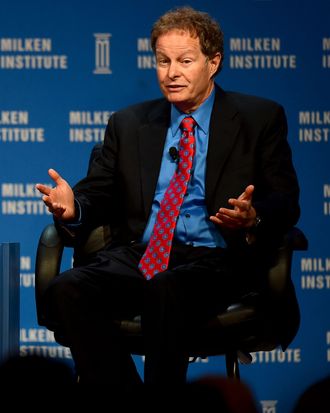
Take heart, fellow Americans: Whole Foods CEO John Mackey has a solution for all our health-care woes — just eat different kinds of food! “I mean, honestly, we talk about health care. The best solution is not to need health care.” Mackey said in a November interview with Freakonomics Radio that CNBC caught on Monday. “The best solution is to change the way people eat, the way they live, the lifestyle, and diet. There’s no reason why people shouldn’t be healthy and have a longer health span. A bunch of drugs is not going to solve the problem.”
Mackey’s comments are jarring, but his views on health care — namely, that people do not have a right to it — are nothing new. In 2009, the CEO warned against the Affordable Care Act, writing in an editorial for the Wall Street Journal that the legislation would “create hundreds of billions of dollars of new unfunded deficits and move us much closer to a government takeover of our health-care system.” From a certain vantage point, it looks as though the pandemic changed everything. But Mackey is a useful reminder. The world looks different to the wealthy. If you have enough money, the pandemic is something you can afford to ignore.
But Mackey’s employees aren’t as insulated from our dystopian moment. While full-time Whole Foods employees have access to company health insurance, part-time workers do not, thanks to a 2019 policy change. As the CNBC story notes, Whole Foods says the change affected “less than 2 percent of its employees,” and that it would help workers find alternative health-care options. In retrospect, though, that policy change was something of a harbinger. For nearly a year, Whole Foods workers have complained that the company, which was purchased by Amazon in 2017, did little to protect them from the pandemic. On May 1, workers at a variety of Whole Foods locations across the nation staged protests over the company’s alleged failure to enforce social distancing in stores or to provide adequate personal protective equipment to workers. (Whole Foods has insisted throughout the pandemic that it has adhered to local and federal guidance on safety standards and that workers have plenty of PPE.) The company ended hazard pay for workers in June, though the pandemic was nowhere near over and its parent, Amazon, reported record profits for the year.
There are a lot of reasons, in other words, for Whole Foods workers to feel strongly about an issue like health-care reform. Mackey, meanwhile, can afford to suggest lifestyle changes as a potential solution for their woes, an attitude that does seem to be in keeping with the Whole Foods retail philosophy. The store is designed to make middle-class liberals feel better about their shopping habits: It offers high-quality food, much of it organic, alongside a plethora of essential oils and homeopathic remedies. Shop at Whole Foods, and you’ll feel better; your individual choices can add up to a healthier, more vibrant self. “I see how long I slept. I see the quality of my sleep. I see what my pulse rate was for the whole night,” he told Freakonomics Radio host Stephen Dubner. But having an estimated $76 million probably helps a person sleep, too. It’ll certainly buy you a decent health-insurance plan. For everyone else, Whole Foods sells an Organic Elderberry Immunity Boost Wellness shot for $3.99.






























